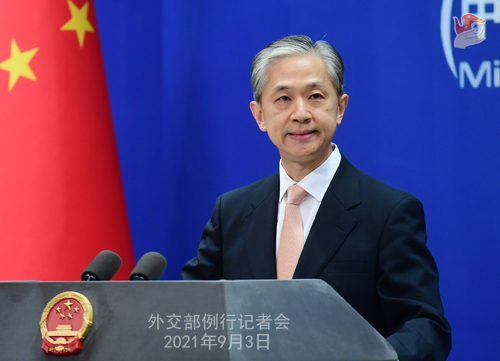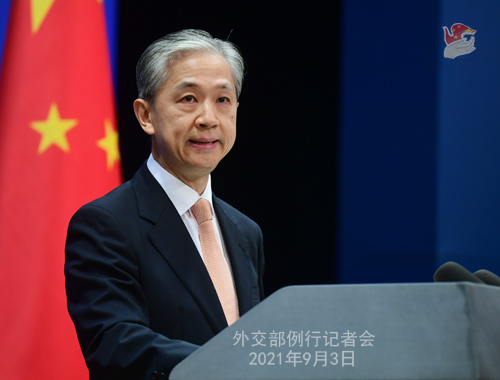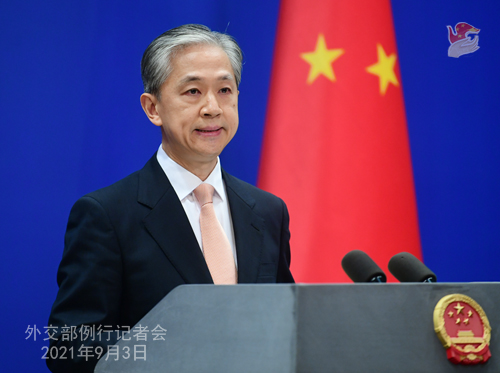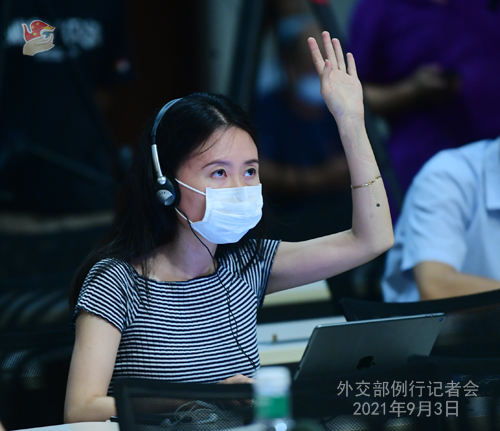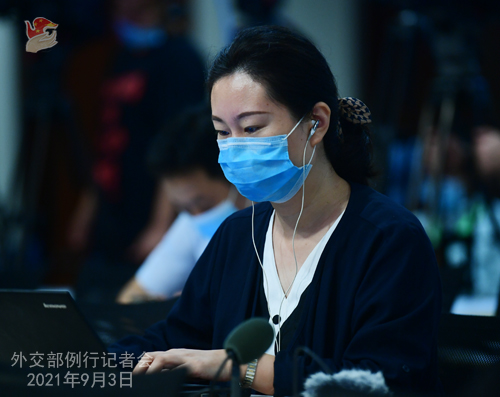| Foreign Ministry Spokesperson Wang Wenbin's Regular Press Conference on September 3, 2021 |
| 2021-09-04 06:16 |
|
CCTV: Today marks the 76th anniversary of the victory of the Chinese People's War of Resistance against Japanese Aggression and the World Anti-Fascist War. We've noted that this morning the Chinese and Russian sides held commemorative activities at the Dongning Fortress Museum in Mudanjiang, Heilongjiang province, where State Councilor and Foreign Minister Wang Yi and Russian Foreign Minister Sergey Lavrov delivered speeches. Could you share more details about this? Wang Wenbin: The victory of the Chinese People's War of Resistance against Japanese Aggression and the Soviet Union's war against Japan marked the final victory of the World Anti-Fascist War. The Dongning Fortress saw the last battle of this war. As State Councilor and Foreign Minister Wang Yi said at today's commemorative event at the Dongning Fortress Museum, this battle was an important witness to how the people of China and Russia fought should-to-shoulder. The victory of the battle shows that all fortresses of evil, no matter how mighty they are, will be crushed by forces for peace and justice. The great victory 76 years ago is of special and important significance for both China and Russia and the entire human history. The UN-centered international system and the international order based on international law established in the wake of WWII has played an irreplaceable role in mankind's cause of peace, progress and development. History shall not be denied and justice shall not be travestied. The victorious outcomes of the World Anti-Fascist War should be earnestly respected and upheld. Unfortunately, even today, some people are still attempting to negate or even beautify the history of aggression, which is a grave affront to human conscience and international justice. The Chinese and Russian people will not allow this, nor will the peace-loving people of the whole world. We will join hands with all countries in the world including Russia to firmly reject erroneous regressive behaviors, defend the victorious outcomes of WWII and international fairness and justice, uphold the UN-centered international system and the international order based on international law, and safeguard world peace and tranquility. Sputnik News Agency: My first question is on Afghanistan. According to al Jazeera, the Afghan Taliban decided to launch attacks in Panjshir province after negotiations broke down with local rebel forces. What is China's comment on that? How will this affect the Afghan situation? The second question. We learned that the 13th BRICS summit will be held in India in September. Will the countries have consultations on the Afghan situation? Can you share some information on that? Wang Wenbin: To answer your first question, it is China's sincere hope that all parties in Afghanistan will go with the Afghan people's eager aspiration and the international community's expectation to resolve differences through consultation and ensure a steady transition so that the people of this war-torn country can live free from war and conflict and build lasting peace at an early date. On your second question, BRICS is an important cooperation platform for emerging markets and major developing countries. As a positive, stabilizing and constructive force in international affairs, BRICS has a tradition of maintaining communication and coordination and jointly stating positions on regional and international issues of common concern. The BRICS countries will carry forward the tradition by leveraging various venues. In fact, BRICS countries had communication and coordination on the Afghan issue recently through such mechanisms as the BRICS Meeting of National Security Advisors. AFP: I have two questions. The World Trade Organization has ruled in favor of a US import ban on Chinese solar panel. How do you view this decision? And also, China is keeping its embassy in Kabul open. Is this a sign that China is ready to recognize a Taliban government? Wang Wenbin: On your first question, China regrets the decision. On your second question, the Chinese embassy in Afghanistan is an important channel for China-Afghanistan exchanges. The embassy is in normal operation. China sincerely hopes all parties of Afghanistan can echo the eager aspiration of the Afghan people and common expectation of the international community, build an open and inclusive political structure, adopt moderate and prudent domestic and foreign policies, make a clear break with terrorist organizations in all forms and live in good terms with all countries, especially neighboring countries. The new Afghan government is not formed yet, which we are following closely.
NHK: Prime Minister Yoshihide Suga announced today that he will not run in the upcoming Liberal Democratic Party (LDP) presidential election this month, signaling a change in the candidate for Japan's prime minister. Do you have any comment? Wang Wenbin: We noted relevant reports. The internal affairs of Japan is not something that we'd like to comment. China Daily: The Forum on the 20th Anniversary of Juncao Assistance and Sustainable Development Cooperation was held on September 2 in Beijing. President Xi Jinping sent a congratulatory letter, and State Councilor and Foreign Minister Wang Yi attended and addressed the event. Could you offer more on the forum? Wang Wenbin: The forum was jointly held by China International Development Cooperation Agency and the People's Government of Fujian Province. Juncao technology, which originated from China, has benefited the world. It is a successful exploration in China's poverty-alleviation efforts and China's important contribution to global sustainable development. During the past two decades, with the personal attention and promotion of President Xi Jinping, China has held 270 international training courses on Juncao technology, which were joined by over 10,000 people from 106 countries. This handy and practical technology, with its fast and remarkable effects on people's livelihood, has taken root in 100-plus countries, generating tens of thousands of local jobs and recording moving stories of how the technology helped lift people out of poverty and brought them hope and a better life. It has become a well-known signboard for China's foreign assistance and poverty-alleviation endeavors overseas. Stories about China's Juncao still circulate far and wide today in developing countries such as Papua New Guinea, Rwanda and Fiji. Small in size, Juncao has become "grass of happiness" and "grass of prosperity" for people in developing countries. It also reflects China's scientific vision and successful practice of seeking harmonious coexistence between human and nature, striving for common development with other countries and accelerating the implementation of the UN 2030 Agenda for Sustainable Development. From poverty elimination to clean energy, from gender equality to biodiversity, Juncao technology is helping achieve many sustainable development goals and providing support for Belt and Road countries and fellow developing countries. COVID-19 has brought major challenge to international development as we speak. At this crucial juncture, cooperation in solidarity and full responsibility is more valuable than ever. China, driven by its aspiration to build a community with a shared future for mankind, will do our utmost to assist more developing countries to achieve sustainable development. We believe with joint efforts of all countries, more stories about sustainable development like the one of Juncao will appear one after another, and the human society is sure to embrace a more prosperous and promising future. CGTN: After the US intelligence community released the so-called report on COVID-19 origins, government officials and scholars from Venezuela, Cuba, Russia and Pakistan, among others, have criticized that report. Recently, more countries have joined them to stand against the politicizing of origins tracing. Do you have any comment? Wang Wenbin: I noted relevant reports. Recently, a number of countries have raised doubts over and criticized the intelligence community-led origins tracing by the US. Zimbabwe's foreign minister said in a statement that the allegation of leaked virus leading to epidemic outbreak lacks scientific evidence and it makes no sense to scapegoat China. Foreign ministries of Belarus, Syria and Djibouti said in their statements that they firmly oppose politicizing the pandemic as a tool, and that using intelligence community and other non-science agencies is not conducive but only leads to division. The health ministries of Myanmar and Cambodia also pointed out in their statements that origins tracing is a scientific issue, and that they oppose groundless accusations against and pressure exerted on other countries. The spokespersons of the foreign ministries of Russia and the Laos said the US intelligence community's origins report constitutes another defile to scientific issue, and that tasking non-science and unprofessional institutions to conduct origins tracing means leading global origins study astray. Previously, more than 80 countries have written to the WHO Director-General, issued statements, or sent diplomatic notes to call for the Joint Report by the WHO-China joint study team to be upheld. Over 300 political parties, social organizations and think tanks from more than 100 countries and regions have submitted a joint statement to the WHO Secretariat on opposing the politicization of origins tracing. The response from the international community fully shows that the US politicization of origins study finds no support and politicizing origins tracing to scapegoat others will end up in failure. The international community should exclude the disruption of political virus and create a sound environment for science-based origins tracing.
Bloomberg: The British aircraft carrier Queen Elizabeth is set to dock in Japan this month after carrying out joint exercises with the US and Japan. What does the Chinese government make of the recent display of military cooperation between these three countries in the Pacific? Wang Wenbin: The practice of sabre-rattling is not constructive. We hope relevant countries will play a constructive role in promoting peace and stability in the Asia-Pacific, rather than doing the opposite. Kyodo News Agency: We understand China doesn't comment on other countries' internal affairs, which is its diplomatic principle. But we noticed that the frequent change of prime ministers in Japan in fact has an impact on its relations with other countries. We have no inkling of who will be the next Japanese prime minster yet. But whoever it will be, I wonder what is the Chinese government's expectation for Japan in foreign affairs going forward? Wang Wenbin: We do not comment on Japan's internal affairs. In the meantime, our position on China-Japan relations remains consistent and clear. We hope our bilateral relations will sustain sound and steady development.
The Paper: A transfer ceremony was held at Incheon International Airport on September 2, during which the ROK returned the remains of 109 Chinese People's Volunteers' Army martyrs to China, marking the eighth such handover. Could you give us more information? Do you have any comment? Wang Wenbin: Yesterday morning, China and the ROK held the eighth ceremony for the handover of the remains of Chinese People's Volunteers' Army martyrs at Incheon International Airport, the ROK. The remains of and pieces of articles belonging to 109 fallen soldiers were returned. This marked the eighth such ceremony held by the two sides in consecutive years following the humanitarian principle and a friendly and cooperative spirit. So far the remains of 825 CPV soldiers have returned to their motherland. In the past eight years, the handover work proceeded smoothly thanks to the care of the leaders and joint efforts from both sides. This cooperation of special significance shows China and the ROK's shared aspiration to rise above historical estrangement and open up a future of peace and friendship. It is an important outcome of China-ROK relations that forge ahead in keeping with the times. We stand ready to work with the ROK to carry on the work related to the handover of the remains of CPV soldiers and ensure that more CPV martyrs will return to their motherland. In this process, the friendship between the two peoples, as we believe, will deepen, and the bilateral relations between the two countries will see greater development.
Bloomberg: This morning, just before Prime Minister Suga resigned in Japan, former Foreign Minister Kishida said "Taiwan is at the frontline of the standoff between the US and China. Looking at the situation with Hong Kong and the Uyghurs, I have a strong feeling that the Taiwan Strait will be the next big problem". Kishida is now the only candidate for the prime ministership in Japan. Do you have any comment on his remarks about Taiwan? Wang Wenbin: Taiwan is an inalienable part of China's territory. The Taiwan question concerns the political foundation of China-Japan relations. On the Taiwan question, the Japanese side bears historical responsibilities to the Chinese people for its past crimes and should especially be prudent with its words and actions. We seriously urge relevant individual in Japan to refrain from interfering in China's internal affairs in any form and to refrain from sending wrong signals to "Taiwan independence" forces in any form. Beijing Daily: A ceremony was held this morning to mark the delivery of COVID-19 vaccines and anti-epidemic supplies provided by the Chinese government to Myanmar. Could you offer more details? Wang Wenbin: China and Myanmar are connected by mountains and rivers. The two peoples have a deep "pauk-phaw" bond. Since July this year, the epidemic situation in Myanmar has been deteriorating. The Chinese government decided to provide an additional batch of vaccines and supplies to help the Myanmar side combat COVID-19. On August 18, State Councilor and Foreign Minister Wang Yi announced this move at the Pledging Conference to Support ASEAN's Humanitarian Assistance in Myanmar. With concerted coordination of China International Development Cooperation Agency, the Ministry of Commerce, the Ministry of Foreign Affairs and the Yunnan Provincial Government, all vaccines and supplies have been shipped to border points in Yunnan and will be delivered to the Myanmar side in batches starting from September 3. Officials from China International Development Cooperation Agency, the Ministry of Foreign Affairs, the Yunnan Provincial Government, Chinese embassy and consulates in Myanmar, relevant Myanmar departments and the ASEAN Secretariat attended the ceremony virtually. This is a concrete step taken by China to act on President Xi Jinping's important pledge of making vaccines a global public good. It also embodies the spirit of a community with a shared future for China and Myanmar featuring mutual assistance through thick and thin. South China Morning Post: US Special Presidential Envoy for Climate John Kerry said after meeting Chinese officials that the climate issue is not a geopolitical weapon and that China can do more on climate change response. What's your comment and what does China expect from the meeting? Wang Wenbin: Based on the principles of common but differentiated responsibilities identified in the UNFCCC, and terms of national determined contributions underscored in the Paris Agreement on climate change, parties to the agreements are entitled to the sovereignty in emission targets and actions. As President Xi Jinping pointed out, addressing climate change is not what others ask us to. We are doing so on our own initiative. China has been acting up in ecological development and climate governance. Having over-fulfilled the climate action goals of 2020 ahead of schedule, China announced the objective and vision of carbon peaking, carbon neutrality and new goals of nationally determined contributions last year. China will live up to its words. China's climate actions have received extensive appreciation of the international community. I want to add that, it usually took developed countries one to two hundred years from industrialization to carbon peaking, which China needs only 50-odd years. From carbon peaking to carbon neutrality, the EU will spend 71 years, the US 43 years and Japan 37 years. But the goal China set for itself is 30 years. As the largest developing country, China will spend the shortest time completing the largest cut in emission intensity in the world. This is a full testament to responsibility China undertakes as a responsible major country. The US should shoulder legal responsibilities and conduct meaningful cooperation in climate change with developing countries. We hope the US side can view China and China-US relations in an objective and rational way, remove "stumbling blocks" on the path of China-US climate change cooperation and, in the spirit of mutual respect, equality and mutual benefits, aim for more outcomes in bilateral coordination and cooperation in climate change and other areas.
Reuters: You just mentioned the US "should remove stumbling blocks". What are you referring to specifically? Wang Wenbin: As I said, we hope the US side can view China and China-US relations in an objective and rational way and, in the spirit of mutual respect, equality and mutual benefits, aim for more outcomes in bilateral coordination and cooperation in climate change and other areas. This benefits China and the US, and also the entire humanity. Reuters: A question on Afghanistan. What is China's position on accepting Afghan refugees? Wang Wenbin: China has been handling related issues in line with the spirit of the UN Convention relating to the Status of Refugees and its protocols. We believe the most pressing issue currently is to work for a soft-landing of the Afghan situation to avoid any new civil war or humanitarian disaster in Afghanistan and prevent any undue casualty or refugees at a large scale. We also want to point out that countries concerned should be accountable for what they did over the past 20 years instead of taking to their heels after having created major disasters in Afghanistan or shifting the blame to Afghanistan's neighbors and the international community. Reuters: Will China conduct cooperation with Afghanistan under the Belt and Road Initiative in the near future? Wang Wenbin: China and Afghanistan are traditionally friendly neighbors. We always follow a friendly policy towards the entire Afghan people. China has long supported peace and reconstruction in Afghanistan, provided much assistance to its socioeconomic development and played a positive role in its endeavor to realize self-reliant growth and improve livelihood. China-Afghanistan cooperation under the BRI framework has also delivered tangible benefits to our two peoples. We've noticed that the Afghan Taliban has stated its commitment to fostering an enabling environment for foreign investors. It also believes that the BRI can contribute to national and regional development and prosperity, and hopes to continue to support and participate in it. We hope there will be a steady transition in Afghanistan to deliver enduring peace and stability, which is the premise for external cooperation, and foreign investment and business presence in the country.
|
